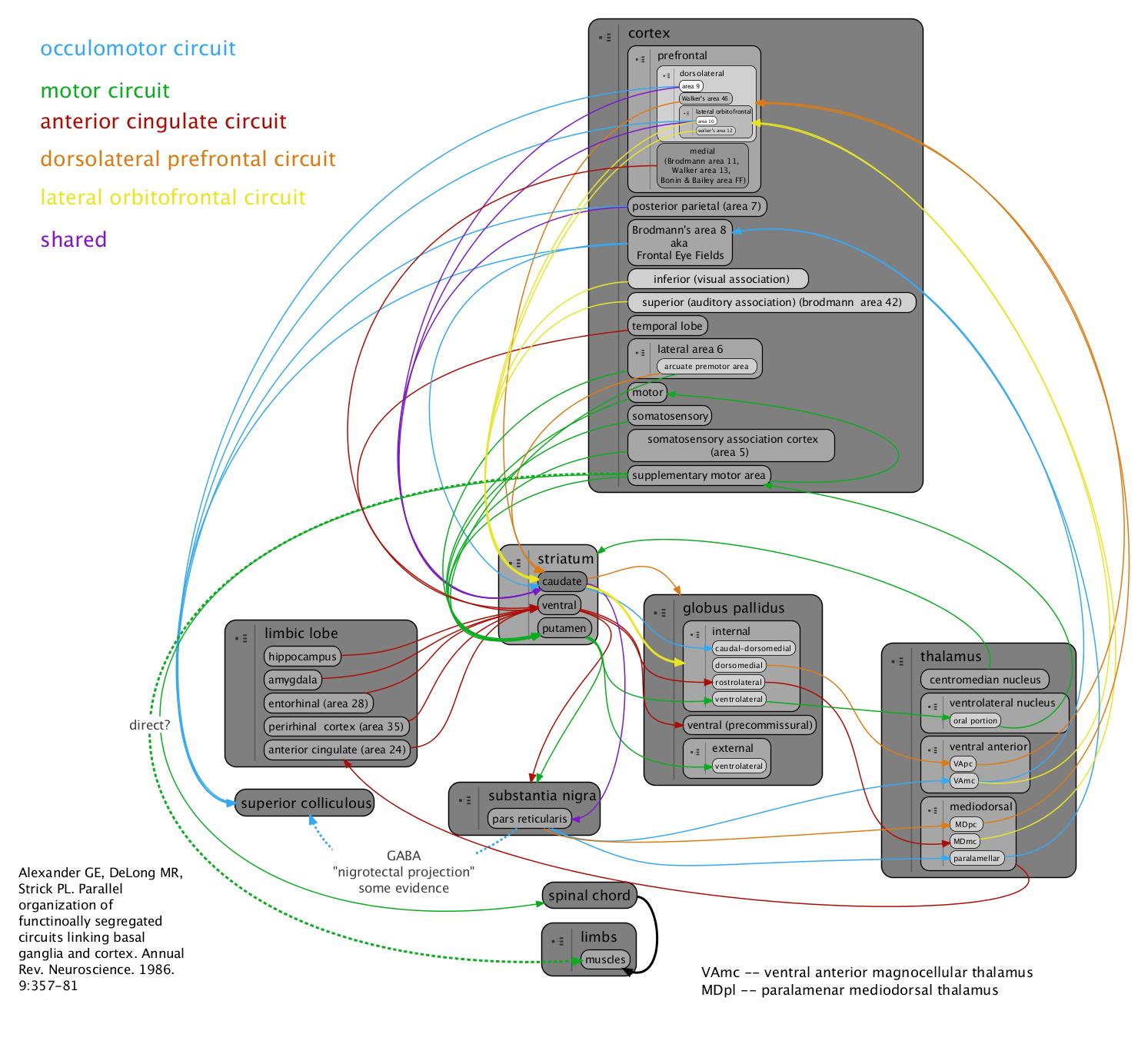PMID 16510720
| Main Page | Search | Input | View Record | Links | FAQ |
|---|
- Title
Cortical and subcortical contributions to Stop signal response inhibition: role of the subthalamic nucleus.
- Authors
Aron AR, Poldrak RA.
- Year
2006
- Abstract
Suppressing an already initiated manual response depends critically on the right inferior frontal cortex (IFC), yet it is unclear how this inhibitory function is implemented in the motor system. It has been suggested that the subthalamic nucleus (STN), which is a part of the basal ganglia, may play a role because it is well placed to suppress the “direct” fronto-striatal pathway that is activated by response initiation. In two experiments, we investigated this hypothesis with functional magnetic resonance imaging and a Stop-signal task. Subjects responded to Go signals and attempted to inhibit the initiated response to occasional Stop signals. In experiment 1, Going significantly activated frontal, striatal, pallidal, and motor cortical regions, consistent with the direct pathway, whereas Stopping signif- icantly activated right IFC and STN. In addition, Stopping-related activation was significantly greater for fast inhibitors than slow ones in both IFC and STN, and activity in these regions was correlated across subjects. In experiment 2, high-resolution functional and structural imaging confirmed the location of Stopping activation within the vicinity of the STN. We propose that the role of the STN is to suppress thalamocortical output, thereby blocking Go response execution. These results provide convergent data for a role for the STN in Stop- signal response inhibition. They also suggest that the speed of Go and Stop processes could relate to the relative activation of different neural pathways. Future research is required to establish whether Stop-signal inhibition could be implemented via a direct functional neuroanatomic projection between IFC and STN (a “hyperdirect” pathway).
- Keywords
striatum; frontal; activation; fMRI; cognitive control; imaging; Parkinson’s disease
- Reference
- Input Author
A Howe
- Notes
Experiment 1 : number of subjects : 13 male : 9 female : 4 mean age : 29.2 +/- 4.5 yr handedness : right language : English health : healthy
Experiment 2 :
number of subjects : 5
male : 1
female : 4
mean age : 23.8 +/- 3.7 yr
handedness : right
language : English
health : healthy
from fMRI Analysis :
Go/NoGo Task Regions : putamen, thalamus, subthalamic nucleus, globus-pallidus, motor cortex, supplementary motor cortex, inferior frontal cortex, pre-supplementary motor cortex, auditory cortex, medial frontal cortex, anterior cingulate cortex, orbital/insula cortex, caudate
Go-null -- motor response with no terminate signal putamen, thalamus, subthalamic nucleus, globus-pallidus, motor cortex, supplementary motor cortex
Stop-inhibit -- motor response halted in response to terminate signal inferior frontal cortex, pre-supplementary motor cortex, subthalamic nucleus, globus-pallidus, auditory cortex, medial frontal cortex, anterior cingulate cortex, orbital/insula cortex, caudate
Stop-respond -- motor response given despote terminate signal inferior frontal cortex, pre-supplementary motor cortex, subthalamic nucleus, globus-pallidus, auditory cortex, medial frontal cortex, anterior cingulate cortex, orbital/insula cortex, caudate
- Closely related pages (vote or nominate related pages)
- Links out:
- Google 16510720
- Wikipedia 16510720
- PubBrain
- PMID 16510720
- -coming soon...ucla cognitive atlas-
- Database links
